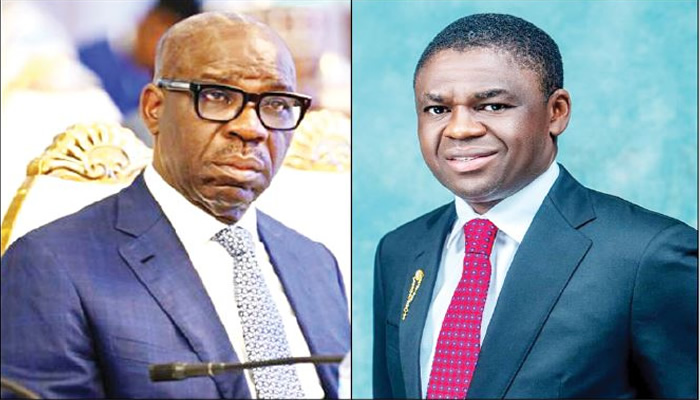In a recent television appearance, Edo State Deputy Governor Philip Shaibu made headlines by mocking the state’s governor, Godwin Obaseki, regarding his defeat in the recent governorship election. This election, which saw a fierce competition between various political parties, resulted in a victory for the All Progressives Congress (APC) candidate, Senator Monday Okpebholo. Shaibu expressed a sense of vindication, emphasizing that Obaseki lost even in his home local government area, which further intensified the already existing rivalry between the two political figures. Shaibu’s comments highlighted the deep political divisions within Edo State, indicating unresolved animosities and the lingering debates over leadership effectiveness.
During his segment on Arise TV, Shaibu asserted that Obaseki had never genuinely won an election and implicated that his successes were largely due to Shaibu’s own contributions and efforts. The deputy governor pointed out that while he managed to secure victories in his voting unit, ward, and local government, Obaseki was unsuccessful in his own area. This was a significant point that Shaibu articulated, as it signaled not just a personal victory for him but also raised questions about Obaseki’s electoral capabilities moving forward. Shaibu’s insistence that he had consistently supported Obaseki in previous elections has evidently stirred the political landscape, generally revealing a fraught relationship between the two leaders.
Shaibu went further to challenge Obaseki, demanding that he take accountability for his loss and suggesting that he should publicly apologize to the people of Edo State. This demand for an apology underscored Shaibu’s criticism of Obaseki’s leadership and electoral performance. The deputy governor’s rhetoric indicates a broader electoral discourse in which accountability and public service are placed under scrutiny, especially when political figures fail to meet the expectations of their constituents. It seems Shaibu is leveraging this electoral outcome not just to diminish Obaseki but also to rally public sentiment against him.
In the context of the election results, the Independent National Electoral Commission announced that the APC candidate Okpebholo triumphed with a significant margin, receiving a total of 291,667 votes. His closest competitor, Asue Ighodalo of the Peoples Democratic Party (PDP), amassed 247,274 votes, while Olumide Akpata of the Labour Party (LP) trailed far behind with only 22,763 votes. This electoral scenario illustrates the fragmentation of political support among the oppositional parties in Edo State, where the APC’s victory not only accentuates its dominance but also emphasizes the challenges facing the PDP moving forward.
Moreover, Obaseki’s loss in his local government area of Oredo to the APC starkly demonstrates the shifting dynamics in Edo State politics. Losing in one’s own political bastion is detrimental for any incumbent and serves as a significant warning sign about the governing party’s relevance and grasp on public sentiment. Shaibu’s comments after the election illustrate a growing perception that Obaseki’s administration is increasingly seen as disconnected from the electorate, potentially alienating key voter bases that could have been staunch supporters.
Overall, the tumultuous nature of this recent governorship election in Edo State, underscored by Shaibu’s comments, emphasizes the volatile landscape of Nigerian politics. The public’s reaction and the political discourse that follows will undoubtedly influence the strategies and narratives that both parties and individual politicians will adopt in the future. As the political landscape continues to evolve, the relationship dynamics between Shaibu and Obaseki, alongside the development of party policies and public engagement, will play critical roles in shaping the state’s governance and electoral success in the years to come.














